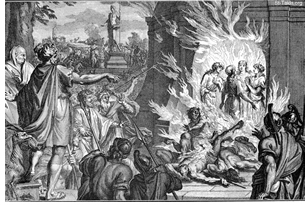A Look Ahead to the End
What Daniel’s deportation to Babylon and his glimpses of God’s future plans can teach us in the here and now.
Lots of people like to read books, stories, and novels. Some like to read the back cover first to find out what the book is about, and then they go straight to the end of the book and read the last few pages. Not the most effective way to draw out the suspense.
It’s different with God. He has used people in wonderful ways, showing them many things up to the end of time, and yet the Lord always keeps things very interesting. His redemptive and world history always stay exciting. This is particularly true in the book of Daniel. Far from being just a simple book, it’s definitely worth investigating, for it says:
 “But you, Daniel, shut up the words and seal the book, until the time of the end. Many shall run to and fro, and knowledge shall increase” (Dan 12:4).
“But you, Daniel, shut up the words and seal the book, until the time of the end. Many shall run to and fro, and knowledge shall increase” (Dan 12:4).
We want to read it with a prayerful heart. Daniel was a man who received a glimpse of the future from God, well before the events took place.
In the Best of Hands
Daniel was living in a turbulent era: various great powers were fighting for supremacy. He saw Babylon conquer Assyria, the sieges and captures of Judah and Jerusalem, Nebuchadnezzar’s triumph and death, Medo-Persia conquering Babylon once again, and finally, the return of the Jews to the land (see Ezra, Nehemiah).
The book of Daniel gives us deep insight into Judah’s time in Babylonian captivity, and even into Daniel’s personal life. And, last but not least, it offers us a prophetic survey of the destinies of the nations during the so-called “fullness of the Gentiles.” God established fullnesses (periods of time) when He was no longer speaking to His people, because there was nothing to be said … times when Israel and Jerusalem were being judged by the nations.
The personal destinies described in the book of Daniel range from Nebuchadnezzar to the return of Jesus Christ, and testify to God’s sovereignty and omnipotence. He is the Lord of world history. What we can see in this book as we look ahead to the end is that He, the living God, works everything according to the counsel of His will—both the destinies of nations and of each individual person.
One example that draws us into the book of Daniel: through Jeremiah, God designates the mighty and all-powerful Nebuchadnezzar as His servant and uses him to judge the people of Israel. “Therefore thus says the LORD of hosts: Because you have not obeyed my words, behold, I will send for all the tribes of the north, declares the LORD, and for Nebuchadnezzar the king of Babylon, my servant, and I will bring them against this land and its inhabitants, and against all these surrounding nations. I will devote them to destruction, and make them a horror, a hissing, and an everlasting desolation” (Jer 25:8-9).
 This shows us that God holds everything in His hand. The book of Daniel says that it’s God who establishes and deposes kings. Isn’t that a comfort? Everything has to pass across God’s desk—His eye misses nothing. Israel isn’t simply abandoned to people who can do whatever they want, nor has it ever been. Israel, you, and I aren’t at the mercy of chance or the capriciousness of everyday life: to the contrary. And this also applies to the end of our lives. If God says our time’s up, then our time’s up. That completely takes the pressure off.
This shows us that God holds everything in His hand. The book of Daniel says that it’s God who establishes and deposes kings. Isn’t that a comfort? Everything has to pass across God’s desk—His eye misses nothing. Israel isn’t simply abandoned to people who can do whatever they want, nor has it ever been. Israel, you, and I aren’t at the mercy of chance or the capriciousness of everyday life: to the contrary. And this also applies to the end of our lives. If God says our time’s up, then our time’s up. That completely takes the pressure off.
Since becoming the father of two wonderful children, I’ve become aware of a number of things. I’ve grown more skilled in some areas. When we need a sitter, we’re very careful about who we’re entrusting them to. It wouldn’t be a simple matter to hand your children over to someone you had reservations about from the beginning. So, it’s very important to us that our children are assigned to good teachers, for example. We want to know that they’re in good hands.
Professor Eckstein wrote:
Lord, You are more true to me
than I am myself;
You love me more fully
than I ever could;
My growth and happiness
rest more with you than with me,
and nobody but You is more burdened
with the things that matter to me.
But if this is true
and I can trust You, Lord,
more than I can trust myself,
then my life is better off in Your hands
than in my own.
Yes, God’s hands are the best hands. You and I are in the best hands there are. We can be certain that we are in these loving hands, even in the midst of all the confusion. No invading army or national tragedy can change that. No shelling of nuclear power plants. He is the sustainer of life. When God withdraws His hands, there is nothing. Whether we feel it not, whether we even believe in God or not, the whole of Creation depends upon the Sustainer of life.
Once there was stubborn Israel, who just wouldn’t walk in the ways of God. They recognized the right way, but refused: “Thus says the LORD: ‘Stand by the roads, and look, and ask for the ancient paths, where the good way is; and walk in it, and find rest for your souls.’ But they said, ‘We will not walk in it.’ I set watchmen over you, saying, ‘Pay attention to the sound of the trumpet!’ But they said, ‘We will not pay attention’” (Jer 6:16-17).
And now, as Jeremiah had foretold, Jerusalem was being besieged by Nebuchadnezzar and his army. So we come to Daniel 1:1-2: “In the third year of the reign of Jehoiakim king of Judah, Nebuchadnezzar king of Babylon came to Jerusalem and besieged it. And the Lord gave Jehoiakim king of Judah into his hand, with some of the vessels of the house of God. And he brought them to the land of Shinar, to the house of his god, and placed the vessels in the treasury of his god” (Dan 1:1-2).
In 586 BC, the city of Jerusalem and the temple were destroyed under Nebuchadnezzar, and some of the implements were carried away. And, according to verse 2, it was the Lord’s doing! He gave Jehoiakim, king of Judah, and some of the vessels into enemy hands.
Everything is in the best of hands: His hands. It was God Himself who handed these things over. Also, it is comforting that while this action seemed arbitrary, that was far from true. God determines our enemies’ limits.
Consider the great cruelty that is shocking our world, the Ukraine war, but also conflicts in many other places on earth, as well as the coming Great Tribulation for Israel. Yet God hasn’t taken His hands off the reins; He has all these agitated horses in His hand.
We can also see this in the horsemen of Revelation 6. It is Christ who opens the seals, and until He does so, the horsemen aren’t able to do anything. They can’t just gallop off. Even these are in the best of hands. Christ opens the seals, and then Scripture says of the horse, “Its rider was permitted to…” For example, to take peace from the earth. Or to cause economic inflation, in the case of the black horse. No arbitrariness. “Its rider was permitted to…” From the beginning, God had determined how far Satan, his team of dark powers, and the Antichrist could go.
And what did Jesus say to Pilate? “You would have no authority over me at all unless it had been given you from above” (John 19:11a). Even when Gog and Magog attack, God says, “I will bring you out, and all your army” (Ezek 38:4).
So, it could actually be the case that a head of state would suddenly start a war overnight, similar to what we’re seeing today. As God moves ahead with fulfilling Bible prophecy, nothing will be the same as it was the day before. And, let’s not forget that He is just and will judge justly. The almighty God demonstrates through the book of Daniel how He sustains, arranges, and directs everything with the best possible hands, so that everything eventually ends up just as He, the just God, always intended.
It’s a glorious fact that every person is different; we all have intentions, goals, and wills, as well as different aspirations and opinions, but God nonetheless achieves what He says in the Bible. Miraculous! Do we see how great our God is? He is great above the masses, and He can do everything. Whatever is weighing on our hearts, we can count on an all-accomplishing, immeasurably great God.
God Provides Justice
Nebuchadnezzar and his army took away Jehoiakim, some of the implements, and something else: “Then the king commanded Ashpenaz, his chief eunuch, to bring some of the people of Israel, both of the royal family and of the nobility, youths without blemish, of good appearance and skillful in all wisdom, endowed with knowledge, understanding learning, and competent to stand in the king’s palace, and to teach them the literature and language of the Chaldeans” (Dan 1:3-4).
Daniel was one of these men, and was still quite young (cf. v. 6). His Hebrew name combines the concept of judgment or righteousness with the divine title El. Thus, the name Daniel means, “God has given justice.” El is the God and Father of our Lord Jesus Christ. And in the power of El, the living God, Daniel worked at the Babylonian royal court. In El’s power, Daniel in turn administered justice in Babylonian captivity, as he carried out the applicable laws. He was a statesman. In the midst of injustice, our God was using this righteous man to carry out justice. But Daniel was suddenly confronted with an injustice. He was ordered to eat things that weren’t permitted under God’s dietary laws for Israel. Additionally, he and his friends were given names derived from other gods, since it was absurd to the Babylonians that they bore names that were glorifying another (namely, the one true God). They were meant to serve at the royal court and were trained accordingly: instructed in all the anti-godly wisdom of Babylon. This higher education was such a priority for the king that they were also allotted the best of foods, the kinds which the king himself ate. As future representatives of Babylon, these students were expected to completely submit to the king in all religious and political matters.
But Daniel wanted to keep God’s commandments; it was very important to him. He wanted to be steadfast and faithful to his God: “But Daniel resolved that he would not defile himself with the king’s food, or with the wine that he drank. Therefore he asked the chief of the eunuchs to allow him not to defile himself. And God gave Daniel favor and compassion in the sight of the chief of the eunuchs” (Dan 1:8-9).
God saw his heart and gave him grace and mercy in the eyes of the chief eunuch, and his request was granted. God granted justice to Daniel, so he wouldn’t be condemned to something that was ungodly in his day. And in the end, he and his friends looked better and were more well-nourished than everyone else.
Ezekiel 14 calls Daniel a righteous man, and lists him among the likes of Job. What about us—you and me? God has justified us through His Son Jesus Christ. Who can be against us? “Who is to condemn? Christ Jesus is the one who died—more than that, who was raised—who is at the right hand of God, who indeed is interceding for us” (Rom 8:34).
Anyone who has access to an influential person, who can help them out of a tough spot, is in a good position. You and I also have help before the judge—we know Christ. He is interceding for us. We have the best advocate! Maybe you’re suffering from injustice, either within your family, from civil authorities, or at work. Injustice can eat away at us, but we can know that Christ is interceding for us. Even when it’s difficult, we can leave these burdens in the best possible hands and entrust them to the One who grants us justice. We’re dealing with the God who oversees everything, and He doesn’t overlook injustice.
A question worth considering: Are we as righteous as Daniel? Yes, you are also righteous, made so in Christ. In Christ, although we hardly dare think it, you and I would be mentioned in the same breath as Job. Not because we are innately good, but because we are in Christ.
In and through Christ! What does that mean? It means you and I are so closely joined to Christ that our lives are no longer defined by us. In 1 Corinthians 6:11, Paul shows us the glorious fact that everyone in the body of Christ is washed clean, sanctified, and declared righteous. Jesus’ righteousness is yours and mine. Despite all our faults—which may seem ever-present and cause us to suffer—nothing and no one can use them to condemn us.
There is one more thing we can observe and take away from Daniel’s behavior with regard to righteousness and justice. Daniel was living under a system that actively opposed God. Recall that Daniel and his friends were given the names of Babylonian gods and foods contrary to God’s dietary laws for Israel. The state engaged in practices such as sorcery and dream interpretation through occult means. Daniel demonstrates how to live in a warm, honest, and loving way; as an example of the faith, where anti-Christian currents and sentiments prevail. And, what’s striking is that Daniel wasn’t in an uproar over it. He never caused offense. He showed respect for his superiors, the government officials. His speech and actions were full of great patience and kindness. He declared his position in love, with an impressive testimony.
He asked to live in accordance with the Bible. It’s also interesting that he didn’t try to impose his convictions on everyone else in Babylon. This shows that we needn’t, and shouldn’t, go along with the crowd in social developments. We can instead remain calm and relaxed, because we know that everything will turn out as it must. We can also see here that God procured justice for His righteous ones, even under this ungodly system. Where there seems to be no escape, God creates options.
After God granted justice to Daniel and his friends, and they ended up looking better than the others despite eating their own food, the Lord gifted them with broad wisdom and knowledge. Daniel was given a special understanding of visions and dreams, and this is where we find our look into the end of days.
A Panorama of World History
“As for these four youths, God gave them learning and skill in all literature and wisdom, and Daniel had understanding in all visions and dreams. At the end of the time, when the king had commanded that they should be brought in, the chief of the eunuchs brought them in before Nebuchadnezzar. And the king spoke with them, and among all of them none was found like Daniel, Hananiah, Mishael, and Azariah. Therefore they stood before the king. And in every matter of wisdom and understanding about which the king inquired of them, he found them ten times better than all the magicians and enchanters that were in all his kingdom. And Daniel was there until the first year of King Cyrus” (Dan 1:17-21).
What does it mean that God gave Daniel understanding in all visions and dreams? Much of what Daniel saw has already been fulfilled in history. But our wonderful God also gave him a glimpse toward the end of things, as becomes clear in his interpretation of Nebuchadnezzar’s dream about the statue: “but there is a God in heaven who reveals mysteries, and he has made known to King Nebuchadnezzar what will be in the latter days…” (Dan 2:28).
We can also translate, “what will be in the latter days” as, “what will happen late in the day.” This end of days or lateness means the end of days after the time of Tribulation, when the Lord returns. It’s striking when we look at the statue depicted in the dream: The golden head represents Nebuchadnezzar and the Babylonian Empire, which had taken possession of Jerusalem. From this point in time onward, Jerusalem was in the possession of all the other kingdoms symbolized by this sculpture. The Lord says, “They will fall by the edge of the sword and be led captive among all nations, and Jerusalem will be trampled underfoot by the Gentiles, until the times of the Gentiles are fulfilled” (Luke 21:24).
This means that Jerusalem, which is “trampled underfoot,” is associated with the times of the Gentiles, or even the fullness of the nations; and it all began with Nebuchadnezzar, the golden head. The temple was gone, the city was under foreign rule, and some of the temple implements were now among the nations. We see in the book of Daniel that God gave this world domination, this kingdom, into the hands of the nations. And when will these times be fulfilled? When Jerusalem is no longer being trampled! Since Jerusalem will also be trampled underfoot in the Great Tribulation (Rev 11:2), the time of the nations will be fulfilled when Christ returns. Luke 21:25ff. speaks of the Lord’s return immediately after it mentions the time of the Gentiles.
In this look into the future, we can see how everything is still in the best of hands. This is shown through the statue in Nebuchadnezzar’s dream, and in the subsequent chapters of the book of Daniel. One empire after another will be judged for its transgressions, and at the end of it all, the Stone (Christ at His return) will smash the feet of the statue, demolishing the entire sculpture. Self-worship and rebellion against God and His Son will be destroyed. He, the living God, works all things according to the counsel of His will and achieves justice, at the end of the age of nations.
At that time, He will also plead Israel’s case, securing justice for His people through Jesus Christ. With Jesus’ return, the royal, priestly people of Israel will assume leadership over the earth, both politically and in the worship of God. He will embrace His people again!
Daniel saw into the end, and his book is the one that makes it the most strikingly clear that God’s kingdom on earth and Israel’s (and Jerusalem’s) rule by the pagan world were never meant to be thought of as taking place at the same time. Only after Israel had completely relinquished its position of authority, when the implements were gone and the temple destroyed, did the age of the Gentiles (the kingdom of the Gentiles) come into effect. And so, a restoration will only take place when God restores justice to Israel through Christ and He reigns in Jerusalem.
Daniel could see that human improvements of the world won’t achieve anything of value. The kingdom of heaven will reign only when Christ is there. Daniel received all of this wisdom from God.
What is our perspective on this as a Church, as the body of Christ? Perhaps you’d like to be as wise as Daniel. And you are! For we are in Christ, who was made wisdom for us by God, Paul says. Daniel received wisdom from God, and wisdom came to us from God as Christ.
Dreams and visions are obsolete today, because the Word of God has been made fully known through Paul (Col 1:25). There is nothing more to add. In Christ, we have the wisdom to study and understand the Scriptures, and to grow in them. We don’t interpret dreams but His wonderful Word. Daniel was entrusted with the mysteries of God concerning world history. And we, as the body of Christ, have an overview of both the history of God’s world and redemptive history. It’s not limited to Nebuchadnezzar’s reign, but spans from the foundation of the world to its completion. And not just here on earth, but in the entire cosmos. Our position is in the heavenly places. Paul could have written to the Corinthians, “Everything is yours!” Daniel’s writings are also a part of our heritage. We are “stewards of the mysteries of God” (1 Cor 4:1), and we are meant to be investigating them, telling others about them, and teaching them.
When Daniel and his friends were confronted with the king’s fare, they asked to eat godly food for a trial period of 10 days. Why 10 days? One possible answer is found in Psalm 31:15, and relates to the meaning of the number 10 in Hebrew. It is the same character for the word “hand.” The verse says, “My times are in your hand; rescue me from the hand of my enemies and from my persecutors!”
 Daniel and his friends knew that their affairs were completely in God’s hands. We too can know concerning everything that comes our way: My time is in His hands!
Daniel and his friends knew that their affairs were completely in God’s hands. We too can know concerning everything that comes our way: My time is in His hands!
Everything is in the best of hands: the courts, Israel, Daniel himself, the nations, your life and mine and every situation, including the time of the nations until Jesus returns. He will give justice in due time and in all things. We are dealing with the almighty, powerful God, eternal, ageless, and beyond space and time. He sees everything at once. And we’re able to go through life with this God as our Father.
Midnight Call - 10/2023


